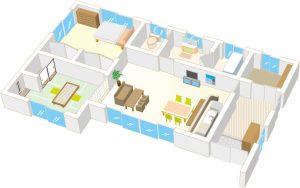Glossary - Japanese Rental Housing -

| Word | Description |
|---|---|
| Lease Agreement | The document which is written the agreement covenants in between the Lessor (lender) and the Lessee (borrower) regarding to the rental properties. Written the details of the subject property and conditions in clearly, and clarify the lease term (lease period), the process for cancellation, and the prohibited matters. In Japan, three types of lease agreements based on various laws are commonly used for rental housing contracts; ・Fixed-term Residential Lease Agreement, ・Ordinary Residential Lease Agreement (usually renewable), ・Temporary-use Residential Lease agreement |
| Contract | The action to start the lease agreement and make the terms effective.as of sign on the lease agreement, and the settlement of the required money and documents. |
| Lease Term / Lease Period | The period designated in the lease agreement ensures the rights of both the lessor and the lessee.
The offers on Apartment-Japan.com cater to both short-term and long-term leases. The minimum lease term is one month,*1 allowing you to choose a lease period of one month or longer based on your preferences. Lease prices and terms may vary depending on the duration of the lease. |
| Short term lease | Apartment-Japan.com defines leases of less than one year as "Short-Term Leases." Rentals are available for periods of one month or longer. |
| Rent (Chinryo) | Rent for the properties is typically paid monthly. For payments made via bank transfer or direct debit, the due date is generally the 25th or the end of the preceding month. For credit card payments, the due date is the 12th of the preceding month. |
| Maintenance fee / Management fee / Administration cost (Kyoeki-hi) | This fee is used to maintain the cleanliness and functionality of common areas in the building, such as hallways, stairs, elevators, and garbage stations. It also covers the replacement of light bulbs and other essentials to keep the building well-maintained and attractive. Additionally, it includes the cost of shared electrical facilities. The maintenance fee is added to the rent and paid monthly. The amount varies depending on the building, with properties featuring amenities such as a janitor or an auto-lock entrance typically having higher fees.However, many properties listed on Apartment-Japan.com may include these fees in the rent, providing added convenience for tenants. |
| Security deposit (Shikikin) | The money which paid to the lessor upon contracting, to ensure the properties returned in good condition without liabilities of unpaid rent. And it will be returned to the lessee after the termination of the contract. The money be used to compensate unpaid rent or/and repair cost for damages or dirt upon evacuation. If the property is returned with damaged beyond normal wear and tear, the cost of repairing that damage may be charged against the deposit, and part (or all) of the refundable deposit will be deducted. |
| Key Money (Reikin) | Key money is different from a security deposit. It is a mandatory, non-refundable payment made to the landlord, often equivalent to one to two months’ rent. Unlike a security deposit, key money is not returned at the end of the lease and is instead used by the landlord to cover necessary expenses such as property repairs or agent fees. This is one of the unique and somewhat unusual customs in Japan's real estate market. It dates back to ancient times when many students or workers moved to big cities for the first time. To express their gratitude for being allowed to rent a room, they offered key money to landlords. In return, landlords viewed this payment as a gesture of goodwill and a promise to take care of the tenants. While this tradition may seem outdated, it remains a common practice in Japan. * Most properties listed on Apartment-Japan.com do not require key money. |
| Renewal fee (Koushinryo) | The renewal fee is a common custom in Tokyo and Kyoto but is usually not required in Osaka. In areas where it is required, this fee must be paid when the lease term ends, and you wish to renew the contract. The amount typically ranges from one to one-and-a-half months’ rent. * Most properties listed on Apartment-Japan.com do not charge a renewal fee. |
| Renter’s Insurance | Casualty insurance focused for the lessee of the rental housing, which perform the compensation of own household goods and the compensation of liability to third parties and landlord. Usually it compensates damages caused by fire, Lightning strike, Rupture and explosion, Wind disaster, Water stained, Violence, Theft, Water disaster etc. (It depends on the commodity of the insurance.) |
| Clean Up Fee / Cleaning Fee / Preparation Fee | The clean-up or cleaning fee is charged for room cleaning after the tenant vacates the property. The preparation fee, on the other hand, covers light cleaning and setting up the rental property before a new tenant moves in. Both fees are typically payable at the time of signing the lease contract. |
| Lock Smith Fee | Fees for changing the entrance door of the property. It is changed for the security purpose. |
| First month rent | The first month's rent is paid at the time of contract signing and is always included in the initial payment.
* This explanation reflects the calculation method used on the Apartment-Japan.com website. Calculation methods may vary depending on the landlord or agency if you deal with them directly. |
| Agency fee | The money (commission) that paid to the real estate agent who found a room for you. Usually, it is equal to a month of rent + tax (10%). Basically, no brokerage fee is required when concluding a contract directly with a property whose transaction type is “lessor” on Apartment-Japan.com. |
| Guarantor | A guarantor is a person who takes responsibility for paying the rent to the landlord if the tenant is unable to do so due to special circumstances. The guarantor is also jointly responsible for all obligations of the lessee. Typically, the guarantor must be a Japanese national. No guarantor is required for "Instant Booking" properties concluded online through Apartment-Japan.com. For other properties, please check the details provided in each property listing. |
| Guarantee Company | A company that acts as a guarantor on behalf of a tenant. It usually costs 50%~100% of the total of monthly payment as of rent, management fee, and fixed water charge, and the payment is made at the time of contracting (signing the lease agreement). And some guarantee companies require the renewal fee, too.Recently, more landlords prefer a guarantee company than a guarantor person. Also, in some cases, the landlord may require joining to a guarantee company in addition to the guarantor person.* DID-GLOBAL's apartments don't require to join to the Guarantee Company. |
| Emergency contact | Emergency contact is someone who will be contacted in case of tenant’s emergency. They do not have any responsibility to pay anything. If the landlord or guarantor company cannot contact with the tenant, the emergency contact will be contacted. To be an emergency contact, it is preferred with co-worker or friends who live in the same city. |
| Application Process | Application Process: The application process is the first step to renting a property. After selecting a property, the lessee must submit the required information and documents to reserve it. Typically, an application deposit is required at this stage, which will later be applied toward the total contract cost. At Apartment-Japan.com, the entire process, from application to contract signing, can be completed online. During the application process, applicants must provide the following: - Personal and emergency contact information - A copy of their passport - Residency status information - Schedule of coming to Japan Additionally, an application deposit (approximately equal to one month's total payment) must be paid. Payment is made via credit card after the contract is electronically signed. |
| Contract | The contract process involves signing the lease agreement, submitting all required documents, and paying the balance of the initial fees. On Apartment-Japan.com, after submitting your application information, you will be asked to confirm the terms and conditions of the lease, the contract details, and the method of key delivery through the website. Once confirmed, you can electronically sign the contract. After signing, you will need to pay the application deposit by credit card. On the 12th of the following month, the remaining balance of the initial fees (minus the application fee) will be charged to your credit card. |
| Move in | After the contract-start-date, Tenant receive the key and move to the property. |
| Vacating | Tenants leaving from the property when the lease terminate. Upon vacating, the inspection is taken by the landlord or the representative of the landlord in order to check the property condition. |
| Tenancy Examination | From the information on the application, the Lessee judges the tenant’s worthiness and trustable. The key point of this check is to assure that landlord to receive rent every month, and whether the tenant treat the property courteously. In some case, there is a chance that they turn down the application. If you are using a guarantor company, their check also will be taken at the same time. |
| Tenant responsibility | The tenant is responsible for keeping the property's condition as same as it was rented. When the property has a serious dirt or damages and required some kind of repairs, it is the tenant’s responsibility to fix it. Most likely, the landlord charges the repair cost and subtract it from the security deposit. Normal wear and tear is excluded. |
| Cancellation | The termination of the lease agreement by the lessor or the lessee for reasons of their own within the contract period. The party who wishes the termination must notify other party in advance in accordance with the provisions. |
| Cancellation penalty | Penalties which is required when lessee cancels before expiration of the lease period. Most likely, the amount is two times of the monthly rent, but it depends on the lease condition. Should be aware of it when searching the property. |
| Compulsory cancellation | Cancellation by the lessor within the contract period caused by the lessee's violation of any of the provisions. In this case, the lessee must evacuate the house with payable of the penalties. |
| Restoration | Repairs done upon vacating in accordance with the provisions, to return the property to the same condition upon moving in. |


